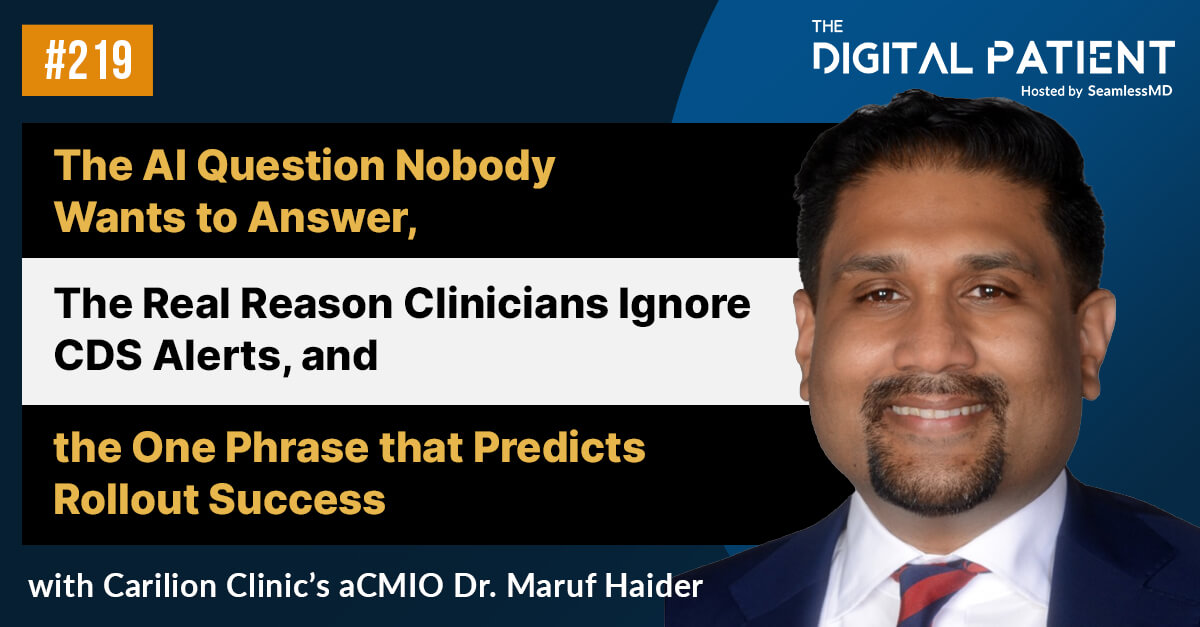Subscribe on: RSS | SPOTIFY | APPLE PODCAST | GOOGLE | BREAKER | ANCHOR
On this episode of "The Digital Patient" podcast, hosts Alan Sardana & Dr. Joshua Liu speak with Dr. Lyle Berkowitz, CEO at KeyCare, about "Building the 1st Virtual Care Startup Directly Partnered with Epic, Advice for Physician Entrepreneurs, The Need For Compensation Redesign to Reduce Physician Burnout, and more..." Click the play button to listen or read the show notes below.
Audio:
Video:
Guest(s):
- Dr. Lyle Berkowitz (@DrLyleMD), Founder & CEO at KeyCare
- Dr. Joshua Liu (@joshuapliu), Co-founder & CEO at SeamlessMD
Episode 99 - Show Notes:
[00:00] Introducing Dr. Lyle Berkowitz, CEO & Founder at KeyCare;
[00:57] How a passion for problem-solving, a desire to make things better, and family influences led Dr. Berkowitz to focus on healthcare, and how as a teenager in the late 70s / early 80s, he was intrigued by the emergence of computers, over time, combining his interests;
[02:03] How Dr. Berkowitz got involved with informatics after discovering a passion for the study of information during his undergrad, doing contract work for doctors, and working with notable experts in the field such as Dr. Arthur Elstein and Dr. Robert Greenes;
[04:29] Why Dr. Berkowitz highlights being open to new opportunities and experiences as taking on the role of CMO with an EHR start-up during the Dotcom boom enabled him to learn, explore opportunities, and think more broadly;
[07:04] Why Dr. Berkowitz advises physicians interested in pursuing business to start slow and dip their toe in by being an advisor to a startup or a fractional chief medical officer and not to worry about the money. He suggests that doctors should be great doctors first – for at least five or 10 years – before jumping into something else, and that they should try to understand how much they want to move into the business arena by starting part-time and gaining experience;
[08:45] Why Dr. Berkowitz warns entrepreneurs who want to enter the healthcare industry to be cautious, citing "The New Thing,” a book that shows the complexity of healthcare with its three-way system of payer, patient, and provider, and how difficult it is to simplify it. However, he also acknowledges the need for disruption and change in the industry;
[10:11] Why Dr. Berkowitz emphasizes the importance of user adoption in health tech and advises entrepreneurs to align their technology with the people who use it, the clinical and financial benefits, and the payment structure. He also highlights the need for easy scalability and incorporation into the electronic medical record (EMR);
[12:34] Why Dr. Berkowitz believes understanding the pain by observing how doctors use tools like electronic medical records is crucial to creating effective solutions, and encourages a shift away from computer technology-based approaches towards human design thinking;
[15:12] How Dr. Berkowitz thinks about resource allocation in healthcare, and specifically why he suggests not everyone should have the same amount of time and attention from a doctor during office visits, sharing a vision where doctors are able to spend more time with complex patients and less with simple ones;
[16:19] How Dr. Berkowitz thinks about a solution to resource allocation, discussing the need for compensation redesign to alleviate physician burnout and allow for more efficient, team-based care. By decreasing patient loads and using technology to manage patient panels, doctors can be paid based on team management and patient outcomes rather than the number of patients seen, allowing for better care and work-life balance;
[18:12] Why Dr. Berkowitz believes in the incentives and benefits of value-based care models, but also emphasizes that fee-for-service models can achieve similar results with cultural and compensation changes, workforce changes, team-based care, and technology to increase panel sizes and downstream revenue;
[19:45] Why Dr. Berkowitz created KeyCare, a virtual care platform built on Epic, that connects health systems to a nationwide network of virtual care groups, to support the “Triple R Threat” of Routine, Repeatable, Rules-based care, emphasizing the importance of health systems offering virtual care in a trusted and collaborative manner, to prevent patients from seeking care elsewhere and to provide better overall care;
[23:35] How there is an increasing prevalence of full-time virtual care providers (virtualists), including primary care, urgent care, and specialty care, and how they are trained and made available through partnerships with virtual care medical groups;
[25:05] Why having KeyCare built on Epic was of paramount importance to Dr. Berkowitz, as having patient's medical data readily available for healthcare providers at urgent care centers allows for more informed decision-making and improved patient trust, and enables the data to be documented within the patient’s originating health record for future decision-making;
[26:22] Why Dr. Berkowitz believes urgent care is the cornerstone of how to help a health system and the greatest need of most health systems that they can't meet themselves, and that primary care is the key to being a population health organization, with urgent care, preventive care, and chronic care being the three legs of the primary care stool;
[28:03] Why Dr. Berkowitz believes KeyCare is the confluence of his experience, relationships in health systems, informatics, innovation, and entrepreneurship, as he has experience with national telehealth, a deep understanding of Epic (having helped roll it out at Northwestern and worked with Health Finch as one of the first three apps on the Epic App workshop), a history of success in entrepreneurship, and a relentless focus on hiring great people to execute on transformational vision;
[29:47] How Dr. Berkowitz is focused on population health enablement rather than just telehealth or virtual care, with a goal of simplifying, automating, and delegating routine tasks to improve efficiency and allow physicians to focus on more complex cases, and why he aims to be a trusted partner to health systems in embracing technology and team-based care to increase physician satisfaction and patient health;
Fast 5 / Lightning Round:
- What is your favorite book or book you’ve gifted the most?
"The Alchemist" by Paulo Coelho
- Who is a person–dead or alive–you’d love to meet?
"Leonardo DaVinci & Dr. William Stewart Halsted"
- Would you rather have Super strength, super speed, or the ability to read people’s minds?
"Mind Reading"
- What is something in healthcare you believe that others might find insane?
"Poorly aligned incentives"
- If you could travel back in time to any event or moment, what would it be and why?
"The moon landing!"
.svg)










.png)
